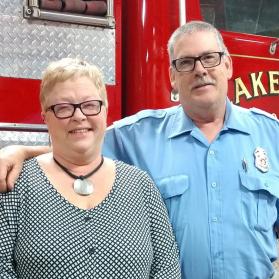
13 Years Beyond Relative Caregiving
Connor Robinson
Denise and Jim call themselves “seasoned”, and after 13 years of fostering, who wouldn’t? What began as a journey to adopt their biological grandson has grown into a very busy household with two adopted children and four foster children. Denise and Jim have built a strong support network of family, friends, and community resources over the years and encourage others to do the same.
Being “seasoned” means Denise receives calls from workers and other foster families, seeking advice or a listening ear. During training and seminars, Denise tells other parents she meets to give her a call if they have any questions. Remembering what it was like when she first began fostering and didn’t have a large support network, she wants to be a source of support. Denise often offers families resources, suggestions, or contact information to connect with other foster parents who have been going through the same things. She shares that everyone has fears and reservations about taking a new placement, and she is no different since you never know what to expect.
The challenges of the unknown are one of the reasons Denise says that fostering is hard work and you must be dedicated. When discussing past placements, Denise shared, “I’ve had hard ones and I’ve had easy ones. It’s difficult because I’ve had kids that have knocked me on the floor, and I’ve had kids that cry and you have to reassure them a lot because they think you’re not coming back because that’s what they’ve known.” Denise adds that when fostering, you have to give an abundance of love. Over the years, she has learned how important it is that each child—biological, adoptive, and foster—gets the same amount of love and no one feels neglected, so she works diligently to find new and fun ways to help them believe that someone cares.
Denise shared a personal experience about children placed with her who were getting speech therapy one day a week through school. Because she felt that one day a week was not effective, she enrolled them in speech therapy outside of school two additional days a week, and the children thrived. According to Denise, people have the wrong view of foster parents if they think about fostering as a way to get rich, as they definitely spend more on the children than they receive from the daily rate. “You have to treat [foster children] like your own kids and make them feel a part of the family,” she says.
For Denise and Jim, treating children in foster care like part of the family often means that they are a part of the family even after reunification. Denise shared that many of their former foster children still call her “mom”, invite them to football games or plays and share school pictures. In addition, many birth parents who reunite with their children include the Davies family as an extended family of sorts, appreciating that their kids were so loved while they were apart.
